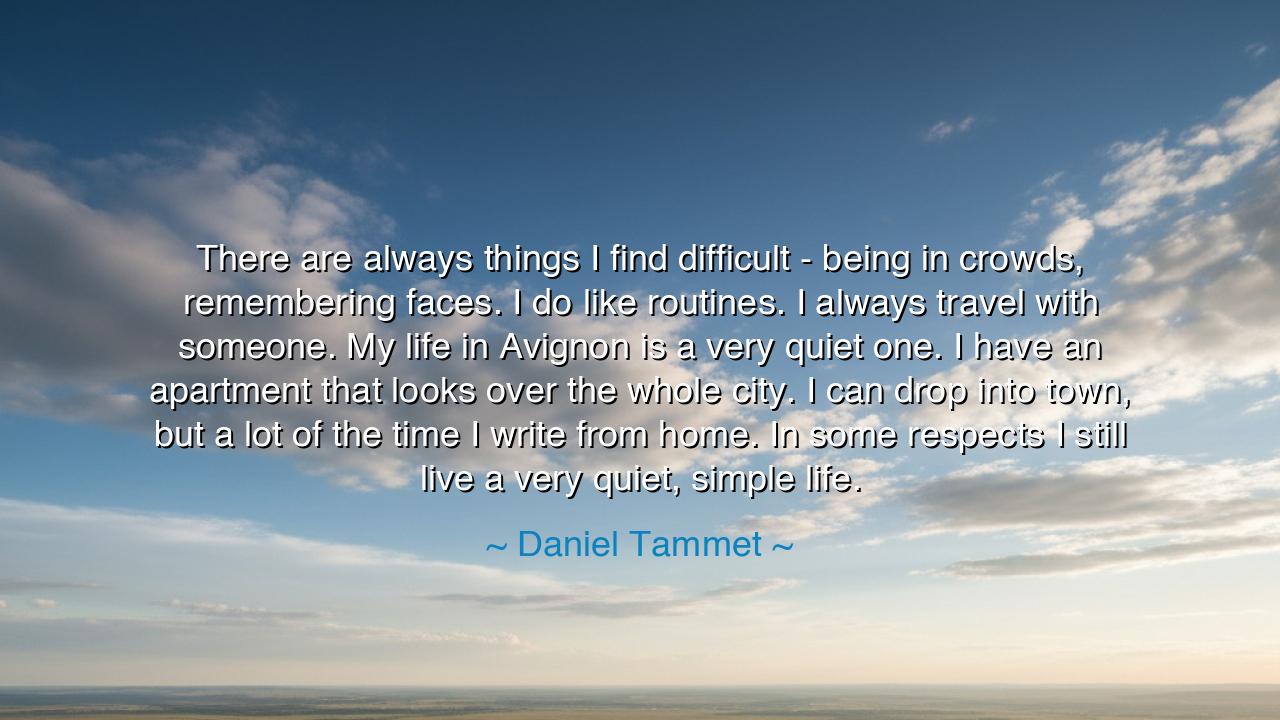
There are always things I find difficult - being in crowds
There are always things I find difficult - being in crowds, remembering faces. I do like routines. I always travel with someone. My life in Avignon is a very quiet one. I have an apartment that looks over the whole city. I can drop into town, but a lot of the time I write from home. In some respects I still live a very quiet, simple life.






"There are always things I find difficult—being in crowds, remembering faces. I do like routines. I always travel with someone. My life in Avignon is a very quiet one. I have an apartment that looks over the whole city. I can drop into town, but a lot of the time I write from home. In some respects I still live a very quiet, simple life." Thus spoke Daniel Tammet, a man whose mind is vast as the constellations yet whose heart seeks the gentle stillness of the familiar. His words remind us that wisdom does not always dwell in the loudness of the world, but often in the embrace of simplicity, in the patient rhythm of quiet days.
This teaching is not strange to the ancients. Did not the Stoics say that the true kingdom of man is mastery of the self, not dominion over others? Tammet, though blessed and burdened with the brilliance of numbers and languages, confesses his frailty in crowds, his struggle with faces. Yet what he reveals is not weakness, but balance. He knows that the soul finds rest not in the endless chase of the marketplace, but in the order of routines, in the quiet contemplation of life’s patterns. To admit one’s difficulties is the first step toward living in harmony with them.
Consider the example of Diogenes, who chose a barrel over a palace, and whose lamp sought honesty rather than grandeur. He, too, rejected the throng and the noise of false living. His power lay in stripping away excess until only truth remained. So it is with Tammet, whose simple life in Avignon is not poverty but richness—a richness of clarity. To look upon the city from above, to enter when he wishes, and to retreat when the heart demands solitude—this is a freedom greater than that of kings.
Many believe that greatness must roar like thunder, that achievement must stand in the center of the crowd, clothed in applause. Yet Tammet’s words tell us otherwise. True greatness often walks in silence, choosing not the shout of ambition but the still song of quietness. Michelangelo, too, found his genius not in crowds but in the solitude of his workshop, hammering marble until angels emerged. Solitude is not loneliness when it births creation; it is the furnace of art, of thought, of spirit.
Children of tomorrow, heed this: the world will beckon you with noise and clamor, demanding your constant presence, your endless attention. But the spirit withers when it cannot breathe. Seek routines that strengthen you. Cherish the quiet moments where your mind may wander freely, unchained by the demands of the multitude. Do not fear being different; Tammet himself, set apart by the unique ways his mind works, has turned difference into a form of beauty, and in that beauty lies his peace.
In your own life, be mindful of the balance between outward engagement and inner rest. You need not abandon society, but neither must you lose yourself within it. Walk into the city when you wish to meet the world, but let there always be a place—whether in a room, a garden, or a moment of silence—where you may return to yourself. Let that sanctuary be your own Avignon, overlooking your life with clarity.
The lesson is clear: embrace both your difficulties and your strengths. Let them guide you toward a life shaped not by noise but by choice. In choosing simplicity, you choose power. In cherishing quiet, you give space for wisdom to grow. And in honoring the limits of your nature, you discover the boundless freedom of living as you are meant to live.
Thus, remember Daniel Tammet’s example. True greatness does not require grand stages; it flourishes in the simple life, in the quiet routines, in the courage to live faithfully to oneself. Do not despise smallness, for within it lies the seed of eternity. Would you like me to expand this into a narrated teaching script with rhythm and pauses, so it flows like a spoken meditation?






AAdministratorAdministrator
Welcome, honored guests. Please leave a comment, we will respond soon